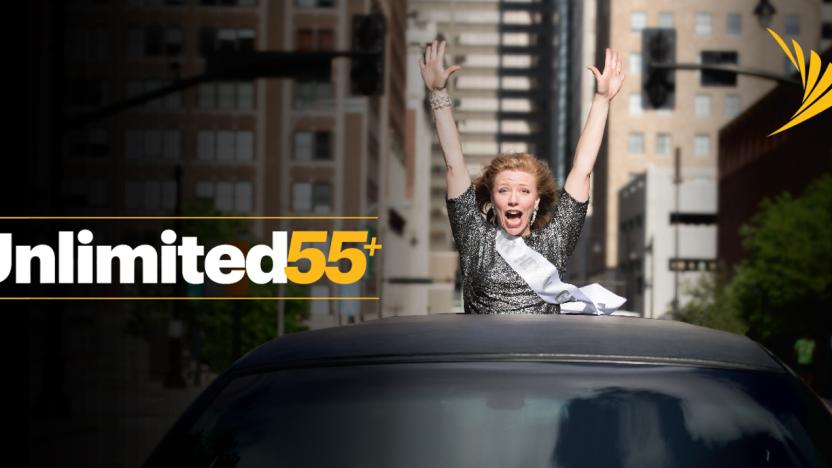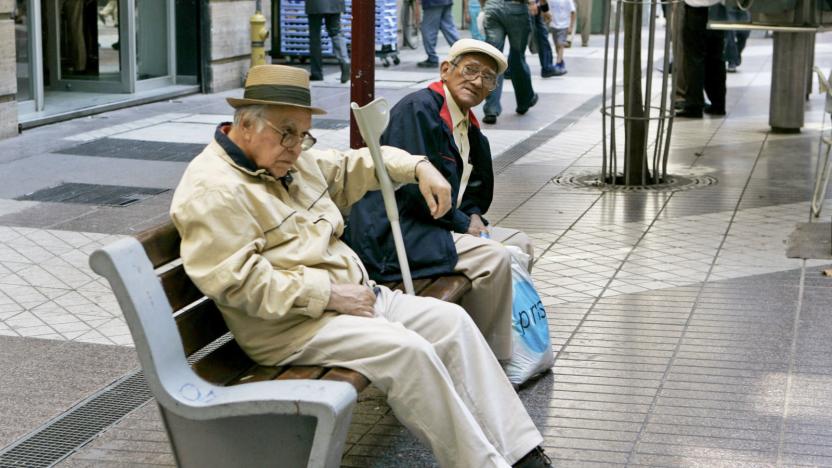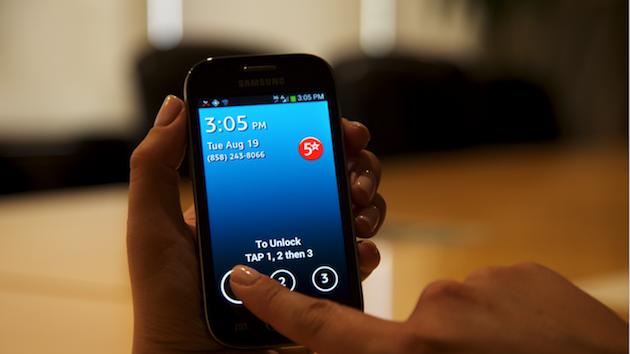SeniorCitizens
Latest

Sprint launches its own unlimited plan for seniors
Baby boomers and their parents can love smartphones just as much as millenials and post-millenials do. T-Mobile recognized that and launched a special plan with unlimited data for subscribers 55-years-old and above last year. Now, Sprint has followed suit: the carrier has announced a very similar plan for new customers 55 and up. The new plan called "Unlimited 55+" -- T-Mobile's is called One Unlimited 55+ -- will set subscribers back $70 per month for two lines with unlimited talk, text and data. And just like T-Mobile's, a single line costs $50, so those interested may want to find a friend to sign up with them.

Sensor tech predicts when senior citizens are at risk of falling
Falls are dangerous for anyone, but they can be particularly worrying for senior citizens whose bodies aren't as resilient as they used to be. University of Missouri scientists may have a way to prevent those slips. They've developed a sensor system that measure changes in your gait speed and stride length to predict likely falls up to 3 weeks before they happen. If you slow down or shorten your stride in a significant way, it can alert health care workers (complete with imagery) so that they can take action before there's an injury.

Comcast is offering cheap internet for old folks
Comcast is launching pilot schemes for its low-cost internet service aimed senior citizens, coming to San Francisco and Palm Beach County, Florida. It forms part of Comcast's Internet Essentials service that launched in 2011,offering cheaper internet connections to low-income families since 2011. Internet Essentials consists of a 10 Mbps connection (recently doubled) for just under $10. The expansion of the scheme should help to cover where are unable to get connectivity, while giving some welcome good publicity to, ugh, this company.Comcast says the scheme has so far "connected more than 500,000 families" to its service. The internet provider also references research from Pew that found that less than half of seniors (aged 65 and older) have high-speed Internet at home. At the same time, alongside improving the speed of the service, Comcast is offering a free WiFi router to existing Internet Essentials customers. [Image credit: Flickr/ Dauno Settantatre]

Apple and IBM customize iPads to help the elderly in Japan
The partnership between tech giants Apple and IBM, which began last year, isn't just about working together on enterprise products. In Japan, the two companies just announced an initiative that will deliver up to 5 million iPads to Japanese senior citizens, at no cost. Apple, IBM and the Japan Post Group, a local corporation that's also involved with the project, say the goal is to "improve the quality of life" for millions of elderly people in the Land of the Rising Sun. How so? Well, the iPads are said to feature custom-built apps by IBM, all designed with senior citizens in mind -- some can be used to set reminders and alerts about medications, or to request help with things like grocery shopping.

GreatCall Touch3: a smartphone designed for the elderly
The Jitterbug brand has long focused on making devices tailored for "aging Americans," combining easy-to-use software with affordable hardware. GreatCall, the creator of those, today revealed the Touch3, the latest addition to its repertoire of phones designed for the elderly. Although the new Touch3 leaves behind the Jitterbug label, its purpose is still very much the same as GreatCall's Touch, Touch 2 and other older handsets. Obviously, GreatCall doesn't intend its new, Samsung-made smartphone to go toe to toe with the Android powerhouses of the world. Instead, the company wants the Touch3's custom software to be the main appealing factor, which features an oversimplified user interface that offers quick access to the essentials, like phone or camera, as well as a set of GreatCall apps to assist in case of an emergency. If you'd like to get one for, perhaps, momma or poppa, the Touch3 is now available in the US for $170 -- but do keep in mind GreatCall does have a monthly fee on some of its pre-loaded, care-focused applications.

GreatCall outs Samsung-made Jitterbug Plus, for folks who want a phone without all the smarts
Adding features to a senior-friendly phone kind of defeats the purpose, but a sleeker design, improved battery life and boosted speaker? Sure, we'll take it. That's what you'll get with the new Jitterbug Plus, a bare-bones mobile phone for users who really only need to make and receive calls, and perhaps check the occasional voicemail. Manufactured by Samsung, the no-frills r220 includes an incredibly straightforward interface, with clearly marked Yes and No button options and large, backlit keys, including a panic button that puts you in touch with a 5Star Urgent Response agent. This latest model also adds a very basic 1.3-megapixel camera, which lets you post photos to Facebook with the touch of a button (you'll need to forgo the Instagram filters, though). The Jitterbug Plus is available now in red or silver for $99 at retailers like Best Buy, Radio Shack and Fry's, along with the company's online store, however pricing is expected to jump to $119 shortly after launch. Overall, the device appears to be a great choice for seniors, though CNET called the phone "overpriced" in its review, which you'll find at the link below.

Clarity Pal hands-on, a new phone for senior citizens
In a perfect world, your grandparents wouldn't need a lick of help getting the most out of a smartphone, but let's face it: the devices are complex, and if you don't have the proper motivation, they can be a bit difficult to learn. You've previously seen the C900 from Clarity, and tonight we stumbled upon its second generation of handsets for senior citizens known as the Pal. Similar to the predecessor, the phone features a panic button on the back that'll call and text message up to five people in the case of an emergency. Other features consist of a backlit keypad that can read aloud the numbers that are pressed, along with a talking caller ID and up to 26dB of amplification for the earpiece. We received a quick demo of this last feature, and the volume was sufficient enough to cut through a noisy room while allowing us to hear everything that was said -- in other words, we have no doubt that the Clarity Pal will be perfectly suitable for those with moderate hearing impairment. The phone is compatible with GSM networks in the US and Canada, and for more ambitious seniors, it features SMS functionality and Bluetooth for pairing with Clarity's headset. Fortunately, the company has gone through a good amount of effort to refine and simplify the menu scheme, which is quite helpful for those wanting only the basics. The Clarity Pal will be available on May 28th through the company's website and will sell for $99. If you've got someone in your life who might need a simpler phone, take a peek at the gallery below. Sean Cooper contributed to this report

Introducing Memo Touch, a tablet designed for elders with short-term memory loss
Here's a product you don't see every day: a tablet designed specifically for senior citizens -- albeit with rather limited functionality. The Memo Touch is designed as a reminder tool for those who struggle with short-term memory loss, and can be used to deliver gentle cues when its time to take a medication, go to the doctor and the like. It's collaborative, too, as family members may add calendar events, phone numbers and to-do items, or even share photos and personalized messages, all from the product's companion website. Based on the Archos 101, the Memo Touch sells for $299 and requires a six-month ($174) or 12-month ($300) subscription. For those who don't take to the new-fangled gadget, the tablet carries a three month return policy, where purchasers may opt to receive a refund or have the tablet restored to its Android roots. Hey, it's one more way of keeping that rascally parent under your thumb, anyway. Overbearing children will find a full press release after the break. Now, where'd we put that damn tablet?

Statistics shocker: nine million Brits say they've never been online, seven million claim they don't know what a 'boffin' is
Nine million British citizens -- many of them senior citizens -- have never been online, according to a recent study conducted by the Office for National Statistics in London. Several factors increase the likelihood that one doesn't regularly log on to the web, they say, including a lack of education, low income, widowhood, and advanced age. While 38 million British citizens now regularly use the internet, the rest -- nearly 19 percent -- remain offline, missing out on the ability to purchase tons of awesome stuff at "discounted" prices, check out their class reunions on Facebook, flame on Engadget, and Tweet suggestive pics at Chace Crawford. Just kidding: the internet is a wonderland and we can't wait to get those 'silver surfers' in on the action.

Jitterbug comes to Verizon's network, 'Can you hear me now' guy replaced by Wilford Brimley
We don't see much of Jitterbug in these parts, though we do love the premise: a simple handset with a nostalgic name designed expressly to not excite Grandma so much. Sure, we were disappointed when the company ditched the three-button controls for a traditional keypad, but apparently even seniors would like to call someone besides "Home," "Operator," or "911" from time to time. And now, Verizon has announced that it will be taking over as Jitterbug's wireless carrier, a move which should result in better coverage and cheaper plans -- doesn't the "greatest generation" deserve at least that much? Full PR after the break.

AIBO matches real dogs in chasing away loneliness, research claims
While robot / human relations seem to be fairly solid at the moment, it looks like the fight has long since been on between canines and their robotic counterparts. Some researchers at Saint Louis University compared Sony's AIBO with a mutt named Sparky at three different nursing homes, to see how residents would respond. Maybe Sparky just isn't that affable, but the researchers found that AIBO and his living breathing competition were both equally successful in alleviating loneliness. AIBO also has the added advantage of, erm, cleanliness, and is easier for senior citizens to take care of, so it looks like Sparky is pretty much out of a job. Get used to it, buddy, it's called outsourcing. [Via Tech Digest]

Japanese seniors shun their robotic overlords
According to reports out of Tokyo, Japanese senior citizens are being turned off when robots get switched on. Ifbot, a helper-robot at a Japanese nursing home which can converse, sing, express emotions, quiz seniors, and perform mercy killings (okay, that last one isn't true), has apparently not been a hit with the elderly residents. "The residents liked Ifbot for about a month before they lost interest," says Yasuko Sawada, the Kyoto-based facility's director, adding, "Stuffed animals are more popular." The news backs up what University of Tokyo geriatric social worker Ruth Campbell says, "Most (elderly) people are not interested in robots. They see robots as overly-complicated and unpractical." Apparently, Japanese electronics-makers have been scrambling to produce robotic assistants for the nation's elderly (which will make up 40-percent of its population by mid-century), but the seniors have been shunning the overly complex companions. This comes as no surprise to us, of course, as our grandparents have been complaining about the "picture radio" for decades.

Nintendo's Wii continues to be a smash with seniors
We know that Nintendo's Wii has been a massive hit with families, but we've also noticed a growing trend with the physically-interactive game system that is honestly a bit of a surprise -- apparently, senior citizens can't put their Wiimotes down. Similar to stories we've seen before, the UK's gossip rag The Sun is reporting that seniors at the Sunrise Home in Birmingham, UK, have taken to the console like super-old fish to water. The pensioners at the institution have been engaging in knock-down, drag-out contests in Wii Sports -- playing tennis, boxing, and bowling with a cut-throat competitiveness not seen since the Dark Ages. Barrie Edgar, 88, one of the home's residents said, "It's great fun. We've only had it a few days but we can't put it down." Mr. Edgar then glanced at Tilda Montgomery, another Sunrise Home occupant and exclaimed, "Prepare to be pwned, you old bird."[Thanks, Arnar]

South Korea outfitting elderly, disabled with bioshirts
Proving that there's more to working in South Korea's Ministry of Information and Communication than just building insect-like robot soldiers for surveillance and killing, the department has initiated a pilot program which was designed to prevent, and not cause, people's deaths. Specifically, the agency is outfitting 100 elderly and disabled folks in Daegu City with so-called bioshirts, which as we've seen before, monitor a patient's vital signs and wirelessly signal for help if anything is awry. Called the "U-Healthcare Service," the $1.4 million program is initially targeting senior citizens who live alone, as well as patients with chronic ailments, and also provides options for running self-diagnostics, enabling remote monitoring, and even rudimentary medical consultations. [Via Smart Mobs, image courtesy of Sensatex]

Motorola patent would allow seniors to rock regular cellphones
We've seen a slew of cellphones designed for use by senior citizens, but they always tend to be big, bulky, and/or rather unstylish -- what if Grandpa is a little hard of hearing, but still wants to impress the hunnies on the shuffleboard court with his handset? Well Motorola may have a solution for the fashion-conscious senior by way of a patent application it just filed, which envisions an audio processor for regular cellphones that boosts the volume if being used by a member of the AARP crowd. Even better, the phone would be able to automatically detect when it was being used by an elderly individual, thanks to speech recognition software that analyzes the tone and pace of the speaker's voice. We used to laugh at the Boost Mobile commercials featuring those hip senior posses, but if this Moto patent is any indication, a world of RAZR- and SLVR-sporting old folks may be right around the corner.[Via Mobiledia]






